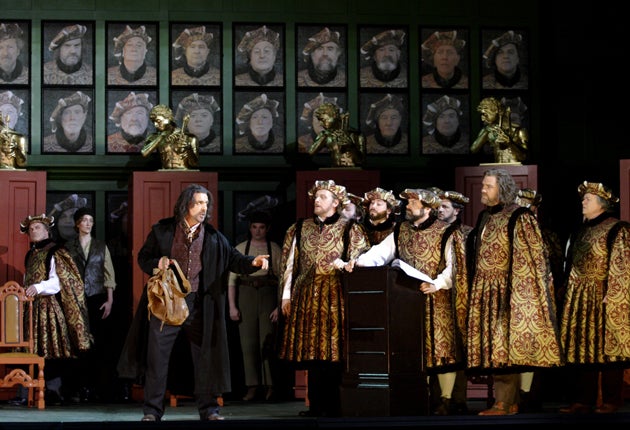Die Meistersinger von Nürnberg, Wales Millennium Centre, Cardiff<br/>Manon, Royal Opera House, London <br/>A Midsummer Night's Dream, Garsington, Oxfordshire
Welsh National Opera's light touch with a romantic comedy refreshingly ditches tradition and flirts with innovation

The Nuremberg of Richard Jones's Welsh National Opera production of Die Meister- singer von Nürnberg is in thrall to an idealised past.
In its loden green song-school, the art of composition has been analysed and codified by the Guild of Master-singers, with symbols for each theme and variation. Our cobbler hero's shoes are hand-stitched, his lasts hung from the beams of a half-timbered shop that heaves with books, a battered upright piano, a coffee pot. The rallies of more recent history have been airbrushed from this Bavarian theme park. Among the several dozen German – and Austrian-born radicals pictured on the front-cloth collage – Bach, Bausch, Beuys, Brahms and Brecht, Handel, Hanneke and Haydn – the most famous of all is absent. As the townspeople celebrate "holy German art", Sigmund Freud and Billy Wilder are their icons, not Adolf Hitler.
This collage by Jones and designer Paul Steinberg is an interesting response to the problems posed by this opera and its performance history. You might quibble with some of their choices – Schwarzkopf and Karajan were hardly rebels – but as Wilder wrote, "nobody's perfect". The tension between tradition and innovation is what drives Die Meistersinger, a romantic comedy made prolix by nationalistic wind-baggery. Wagner handicaps his dramaturgy by using Sachs (Bryn Terfel) as a ventriloquist's puppet and Walther (Raymond Very) as an idealised version of himself. Yet, these often difficult moments flow smoothly in a production that is all about love – romantic, filial and paternal – and a musical interpretation that values the veiled blues and roses of dusk and dawn over cod mediaeval pomp.
The orchestra starts heavily under Lothar Koenigs, whose skill as an accompanist becomes clear in the exchanges between Eva (Amanda Roocroft) and her father (Brindley Sherratt), Sachs's monologue and the heart-stopping quintet. Koenigs seems more interested in the scent of the elderflower tree and the elusive quality of Wahn (variously translated as illusion, delusion, fantasy or madness) than the hot-housed roulades of Beckmesser's terrible serenade, but the chorus's "Wach' auf!" rings with joy and pride. Paragons and caricatures alike are humanised.
Terfel's Sachs is just a heartbeat too old and irascible to allow himself to respond to Eva's passion. It's a complex, serious interpretation, thoughtful, honest and authoritative. Very's Walther starts well, but then unravels. Roocroft's voice also spreads under pressure, but the delicacy of her acting outweighs vocal concerns. Arrogant and insecure, Christopher Purves's Beckmesser is brilliantly detailed, though the stylistic differences with Terfel are unsettling. The richest sounds come from Sherratt, whose gorgeous legato makes Act I a treat. Andrew Tortise's David is cute enough to compensate for a light voice, Anna Burford's warm, bossy Magdalene a perfect foil. Some wobbly ensemble work from the Mastersingers can be put down to first-night nerves. For a company that has lately valued tradition over innovation, this is a shot in the arm.
A "fourth wall" problem dogs Laurent Pelly's Royal Opera House production of Manon. For Anna Netrebko in the title role, the invisible wall that separates the stage and auditorium is there, her only audience the singers around her. For Vittorio Grigolo (Des Grieux), whose laser-bright voice is directed to the rear of the dress circle, it is not. As to the other three walls (designed by Chantal Thomas), think MDF, an Impressionist blur of zinc-grey skies, and the sprawling rooftops of 1880s Paris.
Two ideas dominate Pelly's staging. The first is the predatory nature of the heterosexual male (not a scene passes without the grope of a gloved hand); the second the perilous career of the demi-mondaine (as expressed in the steeply angled sets). Characterisation appears to have been left to the principals, with mixed results.
Though her French is foggy, Netrebko is captivating, her voice lustrous and flexible, calculation and candour expertly blended. Grigolo is a glamorous Des Grieux but seems more interested in communicating his passion to us than to Netrebko. Call me a sourpuss for not succumbing to crisp diction, chiselled cheekbones and oiled pecs (under a cassock!), but I want a Des Grieux who cannot take his eyes off his lover. William Shimell and Russell Braun offer suave support as De Brétigny and Lescaut, while Christophe Mortagne, Simona Mihai, Louise Innes and Kai Rüütel sparkle as Giullot, Poussette, Javotte and Rosette. In the pit, Antonio Pappano expends a lot of energy on Massenet's frothy overture and wrings guilty sensuality from the faux-Baroque suspensions of the Saint-Sulpice scene.
Daniel Slater's production of A Midsummer Night's Dream is set in an enchanted attic of dusty bedroom and nursery furniture (designer Francis O'Connor). The fairies (Trinity Boys Choir) are dressed in tattered military uniforms, guarding Tytania (Rebecca Bottone) from Oberon's (James Laing) wrath. Mark Wilde's Snout/Wall sports a stained mattress, through which Neal Davies and Pascal Charbonneau bill and coo as Pyramus/Bottom and Thisbe/Flute. From the first, yawning glissando, under Steuart Bedford's elegant beat, to the four lovers' (Katherine Manley, Anna Stéphany, Andrew Staples and George von Bergen) sentimental education and the Rude Mechanicals' "tedious, brief tragedy", Garsington Opera's final production in its home of 21 years is faultless: musically refined, funny, perceptive. As Tytania and Oberon are reunited, the fairies reappear in pyjamas – children now, not foot soldiers in an adult war. A happy ending indeed.
'Die Meistersinger': (02920 636464) to 3 Jul, then touring; 'Manon': (020-7304 4000) to 10 Jul; 'A Midsummer Night's Dream' (01865 361636) to 2 Jul
Next Week:
Anna Picard considers Ian Page's completion of Mozart's Zaide
Subscribe to Independent Premium to bookmark this article
Want to bookmark your favourite articles and stories to read or reference later? Start your Independent Premium subscription today.

Join our commenting forum
Join thought-provoking conversations, follow other Independent readers and see their replies